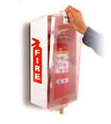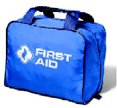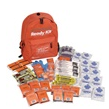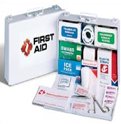Go To - Page 1 The A, B, C's and D's of Fire Extinguishers
Buying and Maintaining Your Fire Extinguisher
DO NOT COPY - ALL contents - Copyright Protected
DRAM Ventures Inc. / www.firesafetraining.com
Examples of;
Fire Extinguishers, First Aid and Emergency Preparedness Supplies
DO NOT COPY - ALL contents - Copyright Protected
DRAM Ventures Inc. / www.firesafetraining.com





So you are thinking of buying one or more fire extinguishers. We hope that after reading the previous pages you will have a better idea as to the type of fire extinguisher(s) you are looking for. You will also be considering more than one for some places - such as your home.
Some questions to ask yourself;
1. What am I wanting to protect? (i.e., home, workshop, vehicle, office, motorhome, etc. ... and there may be other, similar questions you can think of. However - let's look at them one at a time.
#1. What are you protecting? #2. What type of fuel is present? (Class of Fire) This immediately gets you to look at the typical fuel and thus, the class of fire you might expect. Once you know what type of fire to expect, then you will be better able to determine what Class of fire extinguisher to buy. An ABC fire extinguisher is a good, all round choice. Go back and read over the previous pages to help you determine what type or types of extinguishers to purchase. You may decide to get more than one type and size - just ensure they are located in the proper places and not easily able to be switched around. In the "heat" of the excitement of a real fire, you, or whoever reaches for the fire extinguisher will probably assume it is the correct one. #3 How many should I purchase? This is somewhat of an open ended answer however you may be surprised at how quickly the numbers may add up by doing a simple overview of your home, office and vehicles. Putting the correct fire extinguisher in the garage, kitchen and a workshop are good ideas. Another one or two in the basement if you have one is also good. There should be at least one and even more on each level of your home. Each vehicle, boat, and RV should also each have at least one fire extinguisher. 4. What sizes? Common sizes of fire extinguishers are two, five and ten pound. It seems the "standard" size in a vehicle, boat or RV is two pound. Part of the reason for this is the space available in which to locate the fire extinguisher. Your house and workshop - and office, could more easily accommodate five pound extinguishers. ... and some office and commercial buildings will have larger ones. All extinguishers should be mounted securely and clearly labeled as to exactly where they are. This may often be near a fire alarm bell. 5. Does everyone know how to use one? This is a good question to ask as you may discover everyone in the building may require some more specific and formal training in the proper use of a fire extinguisher. (please note that this web site is not intended as a substitute of actual "hands-on" training. Everyone needs to know how to use them and where they are located and what to do in the event of a fire. 6. & 7. What do they cost and where can I buy one (or more)? The cost can vary from a few dollars for smaller, single use fire extinguishers, to considerably more dollars for larger, and rechargeable ones. Almost any hardware / general store should carry fire extinguishers. Look in the section where the store may also carry smoke detectors. (which, by the way, all homes and offices should have several of). The larger, "box" stores will also carry fire extinguishers and smoke detectors. Look in your local "Yellow Pages" or other such similar telephone directory and you may also find other, specialized companies that sell these items. ... and of course thee is always the internet. A very good source of information will also be your local fire department. They will be able to point you in the right direction as to where to find fire extinguishers. The local fire departments may also offer community based training in a variety of home and office safety procedures. ... How to use a fire extinguisher ... may be one of those training programs. What do I do once I have a fire extinguisher? (See Inspection and Maintenance - below)
Inspection An Inspection is a quick check of every fire extinguisher and should be conducted at least monthly. If the fire extinguisher has been located where there are adverse conditions (i.e. on a skidder, bulldozer, etc.) inspect more often - this could be daily. If you are representing a company, it is a good idea (and sometimes a legal requirement) that an actual checklist is followed and documentation of that inspection is kept on file. If the company is large enough, it may have a safety officer which will be part of their job description to do these inspections.
Any issues or problems with the fire extinguisher must be reported and rectified immediately.
2. What types of fuel is present?(class of fire and thus what Class of Fire Extinguisher?)
3. How many should I purchase?
4. What sizes?
5. Does everyone who may be in these locations know how to use a fire extinguisher?
6. What do they cost?
7. Where do I purchase one (or more)?
8. What do I do once I have one? (inspection and maintenance
Are you protecting your home, your car, your boat, or ...?
Fire Extinguisher Inspection, Maintenance and Personnel
Maintenance
Maintenance is taking care of the fire extinguisher(s) over a long period of time. Extinguishers should be given a thorough Maintenance Inspection at least once a year. (A tag with the date and initial of who conducted the maintenance is usually attached to the top of the fire extinguisher) All the same items as noted in INSPECTIONS, should be carried out. If the extinguisher's gauge is not in the "green zone" it must be recharged. If it cannot be recharged then the fire extinguisher must be replaced. Another consideration is whether or not the type (Class) of fire extinguisher is still useful for that particular location. (maybe chemicals are now being stored nearby and the Class of fire extinguisher needs to be changed for these chemicals)
Personnel Has your staff changed? Do you have new contract workers on site? You must check this and if so, they should all be briefed on the company's fire safety procedures.
Go To - Page 1 The A, B, C's and D's of Fire Extinguishers
DO NOT COPY - ALL contents - Copyright Protected
DRAM Ventures Inc. / www.firesafetraining.com
We wish to acknowledge and thank all organizations and persons for the use of all videos and photos on this web site.
